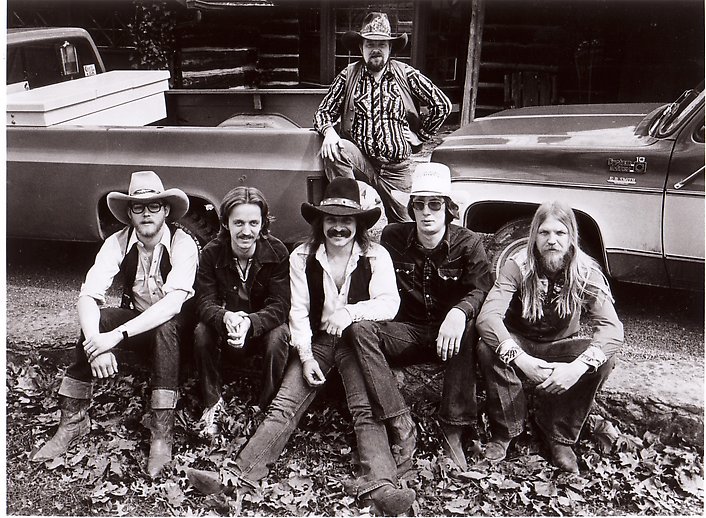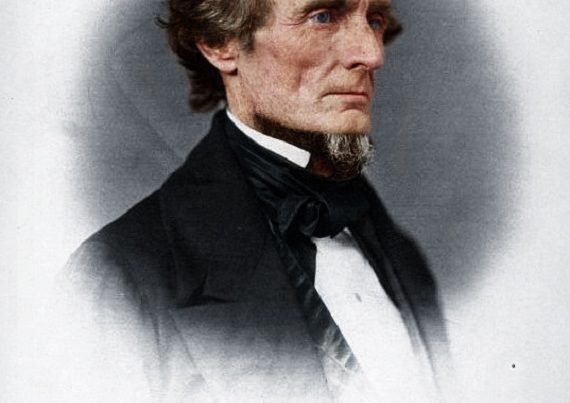A list compiled by Brion McClanahan, Tom Daniel, and Jeff Rogers
Goin’ Down Slow – Duane Allman
When Duane Allman died in 1971, the world lost one of the best slide guitar players in the history of recorded music. By this point, Allman had become famous as part of his Allman Brother Band, but his influence on American music began before he and his younger brother former their band in 1969. His original band Hourglass didn’t have much commercial success, but Allman also performed as a session musician for several major acts at FAME studios in Muscle Shoals, Alabama, and recorded a few tuns as a solo musician, as in the case of “Goin’ Down Slow.”
Please Be With Me – Cowboy
Cowboy formed in 1969 in Jacksonville, Florida. One of the bands founders, Scott Boyer, had jammed with both Duane and Gregg Allman in the band The 31st of February, and Duane Allman later recommended Cowboy to Capricorn Studios. They recorded five albums at Capricorn in the early 1970s with Boyer and Tommy Talton being the only constant members. The band broke up in 1977. Boyer and Talton remained friends and later reformed Cowboy in 2007, recorded a few tunes and did a reunion tour. Boyer died in 2018. This song featured Allman on acoustic slide guitar and was later covered by Eric Clapton.
Livin’ on the Open Road – Delaney & Bonnie
Mississippi’s Delaney Bramlett and his wife Bonnie recorded a few albums in the late 1960s and early 1970s as Delaney & Bonnie and Friends. These “friends” included Eric Clapton and Duane and Gregg Allman. They had some commercial success with seven of their songs reaching the Billboard Top 100. Delaney Bramlett taught George Harrison of The Beatles how to play slide guitar and produced Eric Clapton’s first solo effort in 1969. This song features Allman on slide guitar.
Whipping Post – The Allman Brothers Band
The Allman Brothers were one of those bands that sounded better live, particularly when Duane Allman was part of the lineup. They often deviated from the recorded version of songs and would launch into lengthy jams and medleys that had a New Orleans jazz or Kentucky Bluegrass feel to them, not musically, but in the way each musician would be given the opportunity to show off. This was the birth of Southern rock “jam” music.
Long Haired Country Boy – Charlie Daniels
“Long Haired Country Boy” is one of the definitive anthems of Southern rock. While often categorized as “country”, the song shows the diversity of Southern music. Southerners have wanted Yankees to leave them alone since the 1860s, and Daniels’s defiance is indicative of a longstanding Southern desire for independence from Northern inspired modernity.
Train, Train – Blackfoot
Written by Rickey Medlocke’s grandfather, Shorty, “Train, Train” was one of the band’s biggest hit and is still played on “classic rock” radio stations around the United States. Shorty’s famous harmonica intro (he had a bluegrass band in the 1950s) and the pulsing guitar intro made this song an instant classic when it was released in 1979. Dolly Parton covered the song in 1999, showing that the tune is a timeless and limitless expression of Southern restlessness and freedom.
Fire on the Mountain – Marshall Tucker
American history has been defined by the frontier, and the frontier has been dominated by the South. From George Rogers Clark’s sweeping victories in the American War for Independence to heroes like Daniel Boone and David Crockett, Southerners personified the ideal pioneer. Many Southerners went west in the nineteenth and twentieth centuries looking for adventure and prosperity. California was described as the promised land, with gold in the hills and a better way of life on the horizon. Many died trying to find it. “Fire on the Mountain” is a tale of Southern woe and heartache resulting from a quest for that elusive dream.
Flirtin’ With Disaster – Molly Hatchet
No song exemplifies the quarantine than Molly Hatchet’s “Flirtin’ With Disaster.” “I’m headed down the road and I’m flirtin’ with disaster.” Many Americans are out of money and out of hope, not because of their own doing but because of a heavy-handed government imposed shut down. “We’re flirtin’ with disaster, ya’ll damn sure know what I mean.”
Twice as Hard – Black Crowes
Rich Robinson’s dirty slide guitar intro opens not only this song but the entire debut release from this Georgia Southern rock band. Much has changed for the band over the years, but their first two albums showed that the Crowes were determined to revitalize a 1970s Southern rock sound. It might even be fitting for our COVID quarantine, as it will be “twice as hard” to get back to normal after the shutdown.
The South – Cadillac Three
Cadillac Three formed in Nashville after singer/songwriter Jaren Johnston and two other members of the short-lived band American Bang wanted to continue producing Southern rock inspired country music. Johnston’s father, Jerry Ray Johnston, played drums for the 1980s country band “Bandana,” and Jaren Johnston had a successful songwriting career before his time in Cadillac Three. “The South” is a raucous affirmation of Southern life and identity. “My point ain’t subtle here, I’m a Southern man. Where the beer seems colder and the women seem hotter, where the world don’t seem so damn modern, And where a gold ole boy like me still has a chance. This is where I was born and this is where I will die.”
Highway Jones – Cry of Love
The tune by Cry of Love allowed Audley Freed to show off. His blazing intro and driving rhythm give this song of life on the road the energy it required. Like Blackfoot’s “Train, Train,” or Molly Hatchet’s “Flirtin’ With Disaster,” “Highway Jones” is distinctively Southern in its affinity for picking up stakes and moving on. Alexis de Tocqueville remarked that during his time on the American frontier, principally in the South, he saw several homes that had been started and never finished. That was the pioneer spirit.
You Got That Right – Lynyrd Skynyrd
Steve Gains brought a new energy to the band and added a “honkey tonk” guitar sound, but like Ronnie Van Zant, Gains was killed in the plane crash near Baton Rouge, Louisiana just three days after Street Survivor’s release in October 1977. Van Zant seemed to mesh with Gains’s songwriting style and this song and album left fans wondering what might have been. “I like to drink and dance all night, comes to a fix not afraid to fight, You got that right.”
Straw in the Wind – The Steel Woods
This song is an instant Southern rock classic. The Steel Woods channeled Marshall Tucker in this haunting song of localism and defiance. Southerners have always been clannish, and when outsiders disappeared “like straw in the wind,” particularly those who mouthed off too much, no one seemed to care or pay much attention. Charles Sumner found out the hard way that belittling a Southerner in the presence of his family can be hazardous to your health. This song explains it better than most.
Whitehouse Road – Tyler Childers
Like Christ Stapleton, Jamey Johnson, Shooter Jennings, and several other recent artists, Tyler Childers has been classified as “country.” This might be true to a point, but Childers mixes a “country” sound with bluegrass and rock with a unique Kentucky mystique born from the poverty and darkness of the Appalachian hollers. “Whitehouse Road” is a dark tale of life in one of the poorest regions of the United States. It is authentic and chilling, the two essential ingredients for a Southern blues song.
Rockn’ Into the Night – .38 Special
If we’re all going to die of COVID-19—or the ensuing economic collapse—we might as well grab a loved one and rock into the night. This tune by .38 Special is one of the best party/love songs of the 1980s. Perhaps reminiscing about happier times of love and freedom is just the tonic needed for these dark days.
Home is Where the Heart Is – Firehouse
Firehouse released their debut album right when the Seattle “grunge sound” overtook the music industry. Except for a couple of commercial hits, the band faded into the night, washed out as a 1980s “hair band” that had lost touch with the mainstream trend in the music industry. Virginia born Bill Leverty was the musical genius of the band—his solo albums are pure Southern rock—and Firehouse had a different sound than other “hair bands” of the 1980s. It was dirtier and more authentic. “Home is Where the Heart Is” follows Leverty’s affinity for time and place and shows that Southerners can write good hard rock ballads.
I’m a Fighter – Van Zant
Before becoming the lead singer of the reincarnated Lynyrd Skynyrd in 1987, Johnnie Van Zant had his own band in the early 1980s. Johnny would combine his talents with his brother Donnie Van Zant from .38 Special in the 1990s and reformed the Van Zant band. The two brothers of Ronnie Van Zant recorded four albums under this band name in addition to their ongoing projects with Skynyrd and .38 Special. “I’m a Fighter” merged 1980s hard rock with a Southern sound and was one of Johnny Van Zant’s biggest hits.
I Hear The South Callin’ Me – Toy Caldwell
Toy Caldwell’s distinctive guitar style made Marshall Tucker one of the premier Southern rock bands of the 1970s. After both of his brothers were tragically killed in car wrecks in the 1980, Caldwell left the band in 1983. He formed his own band and recorded a slate of songs that Charlie Daniels later released under the title Son of the South. This tune contains a mix of rock, zydeco, country, and blues, and is quintessential Toy Caldwell. He tragically died in 1993 at the age of 45.
If You Wanna Get to Heaven – Ozark Mountain Daredevils
The Missouri based Ozark Mountain Daredevils capitalized on the Southern musical renaissance of the 1970s and secured two top forty hits, including “If You Wanna Get to Heaven.” Their sound was in line with the Atlanta Rhythm Section and other mellow Southern rock bands, but this song shows the bands Southern bona fides. From the opening harp to the smooth guitar solo and country rock rhythm, the song is pure Southern rock bliss.
Let It Roll – Little Feat
Little Feat founder Lowell George played Southern rock like a Southerner, but he was a native Californian whose father raised chinchillas. George started his rock career with Frank Zappa’s Mothers of Invention, but when that band fell apart, he brought a couple of Mothers of Invention band mates together to form Little Feat. The 1970s Little Feat albums are as Southern as any music of the era, and George understood how to play authentic Southern music. Personal squabbles between the band led to its disbandment in 1978 and George died of a drug overdose in 1979. The other founding members of the band reformed in 1988 and released Let It Roll. This song is a rocking homage to a good time.






